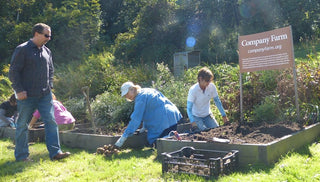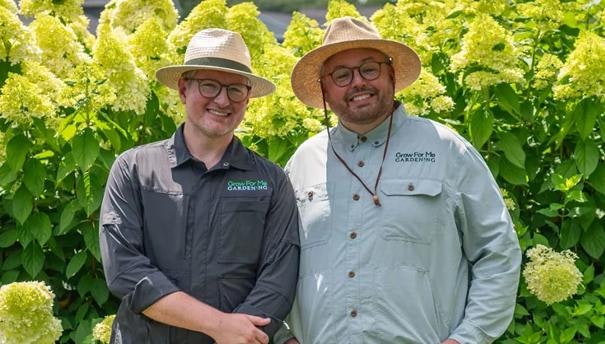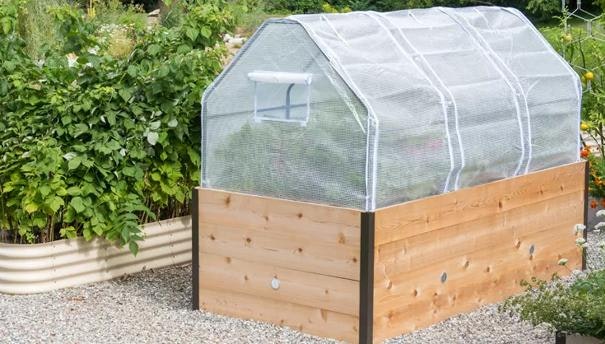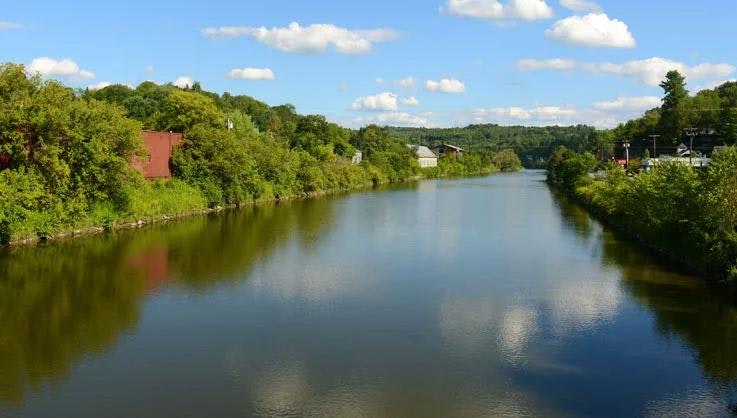We started our Company Farm in 2013 with one simple goal: grow as much food as possible for people in need. It was a way for us to put both our gardening passions and our landscape to good use.
The "farm" began in 27 of our Vermont-made 4-x-6' raised beds on a hillside outside our Burlington headquarters. We decided on potatoes because they're simple to plant and harvest, plus they're an excellent keeper crop — an important consideration for a food bank.
Right from the start, however, it was clear that our planting site wasn't ideal. Even though we had raised beds, the site was waterlogged. Winter snow melt and spring rains kept the beds soggy well into June — quite late for planting potatoes in the northeast.
Still, that first year, the harvest was pretty good — 300lbs! In the second year though, we lost half the crop to rot. By the third year, we had to wait till July to plant, and the harvest was really disappointing.
 The first Company Farm site in 2013.
The first Company Farm site in 2013.From Potatoes to Pollinators
By 2016 we knew we couldn't change the site, so we moved the potato-growing operation to a drier area. In the soggy site, we planted a pollinator waystation full of wetland species that attract bees, butterflies, and other pollinators. Designed in a repeating pattern of plants to ensure lasting beauty and color, the garden provides pollinators with the nourishment they need throughout the entire growing season. And, because the plants are native to our region, they thrive and are magnets for our local pollinators.
 Our pollinator waystation is filled with bee- and butterfly-friendly plants like this stunning milkweed.
Our pollinator waystation is filled with bee- and butterfly-friendly plants like this stunning milkweed.Teams from our other locations are now growing crops for people and pollinators too. It's been such a rewarding and successful program that we asked ourselves, what if we scaled this up? What if we could generate even more food and less hunger for our neighbors, at the same time providing a channel for other businesses to get involved in their communities?
This year we're working with a few pilot sites ready to start their own volunteer-run gardens. We're providing the raised beds and training; each pilot site is providing the soil, seeds and plants, and plant care. At the end of the growing season we'll compile best practices in order to help more and more companies follow suit.
We'd like to see 20 new Company Farms in 2020 — maybe your company will be one of them!
Getting Started
- Growing in raised beds maximizes productivity and minimizes the need for weeding. Plus, raised beds can be easier to tend than in-ground gardens -- especially for people with mobility constraints.
- Choose edible crops that are easy to grow, harvest, and have a long shelf life. Potatoes are a great crop to try, especially if you're just starting out. But there are many other vegetables to try too: squash, carrots, turnips, even tomatoes and lettuce. Check with your local food bank to see what they need and can accept before you plant.
- Work with local farmers, if you can, as they are often willing and fantastic mentors.
- Designate a core Farm Team to oversee the crops, but call on others (everyone!) to pitch in throughout the season to keep the task manageable.





